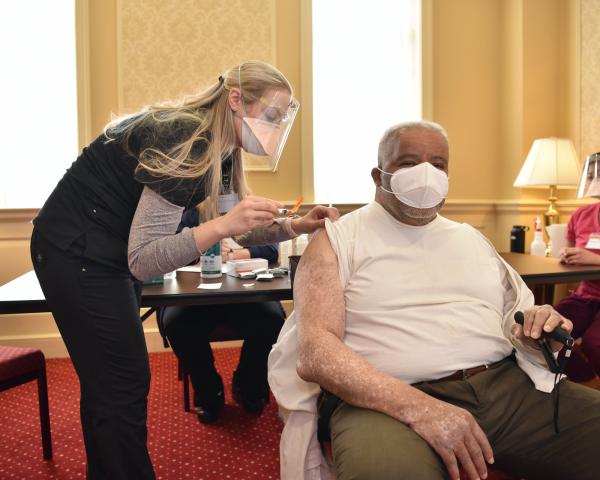How do you convince skeptics to get a COVID-19 shot? Vaccine lotteries have failed, as have appeals to patriotism, partisan name calling, social media censorship and immunization mandates. Many people, it turns out, would rather quit their jobs than roll up their sleeves and get a jab. It's clear that their opposition is now an important part of their identity.
Such intense skepticism has led many policy makers and public health experts to drastic conclusions. CNN medical correspondent Dr. Leana Wen, for example, recently urged the federal government to bar the unvaccinated from interstate travel. “Remaining unvaccinated & going out in public is equivalent to driving under the influence,” she tweeted. “You want to be intoxicated? That’s your choice, but if you want to drive a car, that endangers others. No one should have the 'choice' to infect others with a potentially deadly disease.”
While Dr. Wen and other commentators call for more of what has obviously failed, there's a better way to win compliance from skeptics: treat them like adults and earn their trust. Here's an example of how that can be done, from Orlando's ABC affiliate:
Mark Hall was very clear about where he stood on coronavirus vaccines -- never, ever would he get one … Earlier this month, Hall was settling into his seat at Spurrier’s Gridiron Grille in Gainesville when another man asked him if the empty seat next to him was available. It was. That’s how Hall met Dr. Duane Mitchell, a neurosurgeon and University of Florida Assistant Vice President for Research ...
Hall, the story continued, struck up what turned out to be a three-hour conversation with Mitchell about COVID-19 vaccines. By the end of the night, the once-firm skeptic had decided to get the shot. The University of Florida later posted a follow-up video showing Hall receiving his vaccine and explaining why he changed his mind.
Since vaccine hesitancy remains a serious problem in the US, let's play Monday-morning quarterback and break down the crucial aspects of Hall's and Mitchell's interaction. It will be clear by the end of this exercise why the neurosurgeon succeeded where so many others have failed.
Just a little respect
First and most importantly, the two men were in a venue that facilitates civil conversations between strangers. Hall would have committed a serious fax pas had he called Dr. Mitchell a Big Pharma shill; Mitchell would have looked equally ridiculous had he insulted Hall for being a “Covidiot.” That sort of behavior is the norm on social media, but only lizard people talk that way offline.
If you live in a place where these sorts of interactions are prohibited, or you're trying to protect yourself from infection, then face-to-face conversations aren't an option, but that's not the point. A little civility allows us to bond, which helps us to develop trust in one another. That formula works as well on Twitter as it does at a sports bar.
Many skeptics want good information
Consider Hall's initial justification for refusing a vaccine. “It just seemed like the information was forever changing,” he told the local the ABC affiliate. “One news outlet would put something and then another one would put something and they were always contradictory.” Hall didn't have a partisan urge to reject sound medical advice; he saw the media's COVID reporting for it was—an endless stream of confusing agitprop—and reacted accordingly.
The upside is that Hall really wanted answers to his questions. Once he befriended someone with the expertise to explain the science behind vaccination, he happily listened. “I literally just started bombarding [Mitchell] with questions.” As the local news station reported:
... Mitchell recognized that Hall was genuinely interested in what he had to say, and allowed the conversation to last around three hours. The pattern established itself: Mitchell would make a point, Hall would counter, and then Mitchell would sort out what was fiction vs. fact. 'Just hearing all the conversations and already doing hours upon hours of research, I mean, he solidified what made sense,' Hall said.
Notice the difference between Mitchell's approach and, say, CNN's. Network contributor Max Boot treated vaccine skeptics like hopeless rubes who wouldn't listen, and, predictably, his commentary elicited stubborn resistance from many thousands of people online. It's a self-fulfilling prophecy we've seen play out multiple times over the last year and a half: amplify a problem and you get more of it.
You're trying too hard
What struck me most about the interaction was Mitchell's attitude.
Mitchell said he never went into the conversation expecting to change Hall’s mind. The two remembered Mitchell eventually asking if Hall would be open to a vaccination.
This is counterintuitive, but it's been confirmed by a mountain of science communication research. The harder you try to push your message on someone else, the less effective you'll be. Skeptics don't change their minds because widespread vaccine coverage will protect you from infection. As my colleague Dr. Chuck Dinerstein pointed out earlier this year, that sort of fear-based messaging wears on people's nerves, reducing their willingness to comply. There's a better way to communicate the same information:
Fear is not the only, let alone most effective, tool in healthcare communications. Belief in your ability to 'control your fate,' self-efficacy, is potentially a much better means to move our behavior in the necessary direction.
The reason this approach hasn't been followed as a matter of public health policy, I suspect, is because it's incredibly difficult to employ consistently. It would necessitate coordination between state and federal public health agencies and require media outlets, both left and right, to quit framing "the science" as a partisan issue. Is that possible? I don't know. But what we all know is that boosting vaccine uptake is the goal. When we use that metric, it's clear that persuasion is more effective than anything that's been tried so far.




